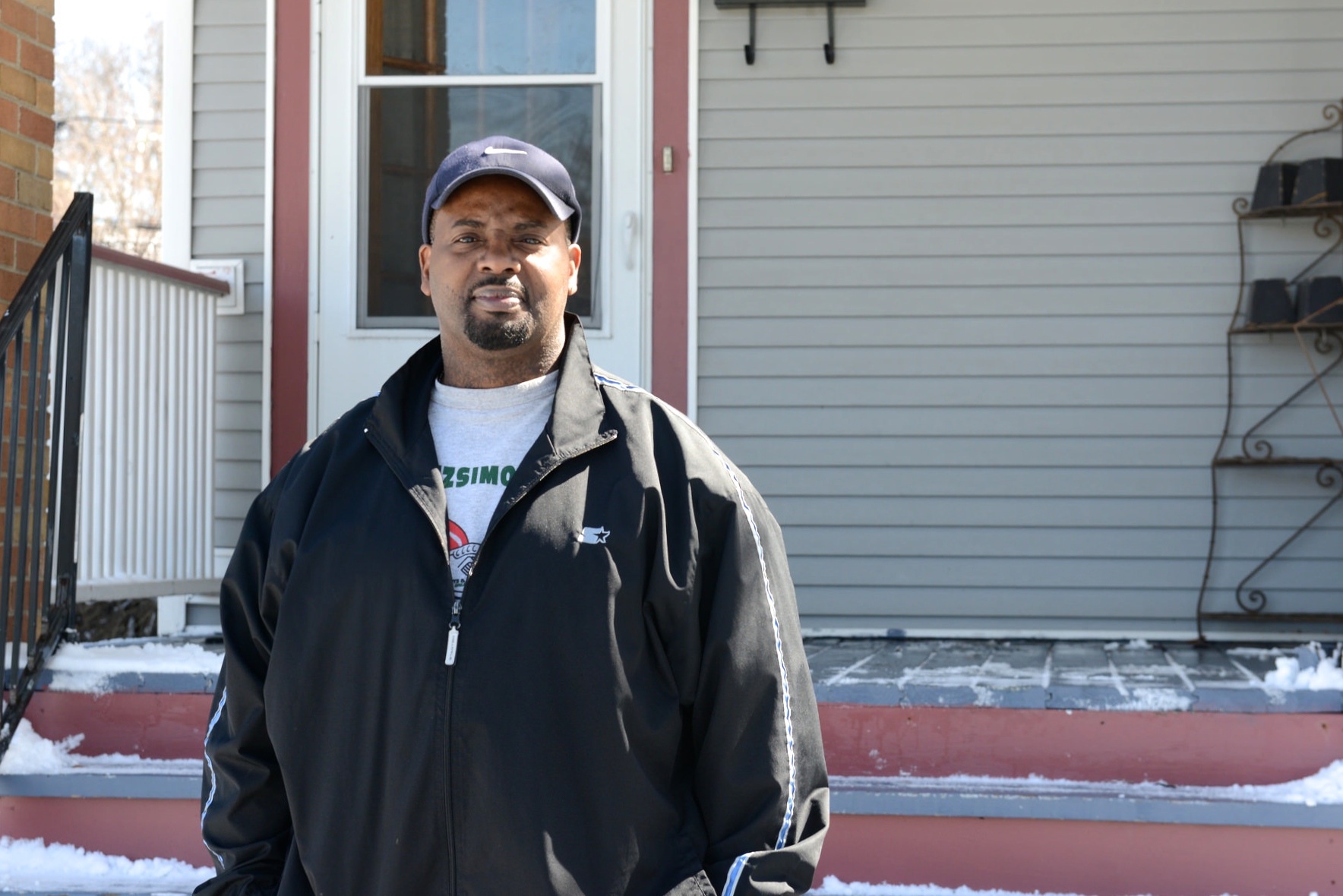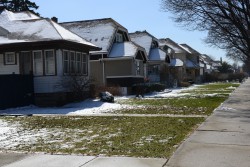Common Ground Fixing Up Sherman Park
Advocacy group has renovated more than 70 foreclosed, distressed homes in Sherman Park.
A transformation has occurred along N. 46th St. from W. Center St. to W. North Ave. in the heart of the Sherman Park neighborhood, where homeowners have completed various home improvement projects such as repairing their roofs and replacing gutters and windows.
The rejuvenation along this small stretch has been spurred in part by the renovation of eight homes on the street by Milwaukee Rising, a campaign to improve the real estate market in Milwaukee by addressing the disproportionate number of foreclosures in Sherman Park.
“They are reinvesting in their homes because the neighborhood will not be so transient,” said Toni Wagner, a Milwaukee Rising volunteer who has lived in Sherman Park for 45 years. “People who live in the neighborhood and invest in the neighborhood are the ones that really care about the community.”
Milwaukee Rising, created by the grassroots group Common Ground, has renovated more than 70 foreclosed, distressed homes in Sherman Park, selling more than 60 of them to individuals and families since the effort began in 2008. Its goal is to rehabilitate 100 foreclosed houses and return them to the local real estate market.
One of Milwaukee Rising’s homes was recently purchased by Randy Jones, a 48-year-old divorcee, who looked at dozens of houses before finding his three-bedroom, two-bath bungalow. The former aldermanic candidate said the effort by Milwaukee Rising will have a long-term impact on the city.
“That’s what is going to change Milwaukee as a whole,” Jones said. “It’s going to start with homeownership. It’s about that sense of belonging and that sense of pride.”
The effort has reduced the number of abandoned homes in the neighborhood, from 300 in 2010 to about 150 in 2015. Because the remaining blighted homes are a breeding ground for crime, 30 volunteer home evaluators from Milwaukee Rising inspect each one monthly, reporting problems such as break-ins to the Milwaukee Police Department or the city.
Milwaukee Rising has received about $1 million in grants from Bank of America, Deutsche Bank and Wells Fargoand about $500,000 in low- or no-interest loans from religious entities and Milwaukee Development Corporation. The City of Milwaukee also allocated about $4 million of federal Neighborhood Stabilization Project funds to the effort. In addition, Bank of America gave the organization 12 houses and $180,000 to rehab them.
“The banks are the ones that caused this problem, so they should be the ones to help rehab and repair these homes,” said Frank Finch III, treasurer of Milwaukee Rising.
Milwaukee Rising uses the funding to purchase properties and hire contractors to do major plumbing, electrical, foundation and general improvements to the houses. The organization then puts them back on the market and the proceeds from the sale of properties are used to pay lenders.
In addition to completing rehabs, Milwaukee Rising has provided up to $5,000 in matching grants to 40 Sherman Park homeowners to make improvements such as replacing a roof or windows. More than $200,000 has been disbursed through that effort.
“When we rehabbed a home, we went to each homeowner on the block and asked them if there was something they needed to get done on their house,” Finch said. “That was really successful.”
According to Zillow.com, which tracks the residential real estate market, the average home value in Sherman Parkhas decreased from $91,000 in 2006 to $51,000 in 2016. The dramatic decline has leveled off since 2012, as average prices have remained steady, between $50,000 and $61,000.
Zillow notes that foreclosures “will be a factor impacting home values in the next several years” in Sherman Park, where 15.6 per 10,000 homes are foreclosed, almost twice the rate for the entire city of Milwaukee and five times the national average.
To stem the long-term foreclosure tide in Sherman Park, homeownership is the key, according to Judy Maher, a contractor who serves as Milwaukee Rising’s project manager.
“This is making a big difference,” Maher said. “There are way too many people renting in Sherman Park who should own — plain and simple.”
Political Contributions Tracker
Displaying political contributions between people mentioned in this story. Learn more.























“The banks are the ones that caused this problem, so they should be the ones to help rehab and repair these homes,” said Frank Finch III, treasurer of Milwaukee Rising.
Sure, it’s not your fault for borrowing more than you can afford to pay back. In the future, I promise to protect you from yourself – when I don’t allow you to borrower money, you’ll know why, it’s because I don’t want you to get foreclosed upon, problem solved.
Please don’t preach personal responsibility to this community.
Instead, teach them to blame others for their problems. Once we teach everyone to be a victim, we’ll have succeeded in saving our community.
Wow the sanctimonious crowd is out early today. Of course it’s merely selective personal responsibility as people (primarily conservatives) preach and ignore that argument depending on the subject.
While surely there is plenty of blame to go around regarding the housing crisis (including Fannie Mae and Freddie Mac), no one can argue that banks adopted incredibly irresponsible lending practices in the early-mid-2000s which allowed hundreds of residents in Milwaukee to take on loans they had no hope of paying off. If the banking industry had held themselves to their prior mortgage standards (PMI if not 20% down, no more than 38% of total income on housing) , these families simply would have been denied a loan. So yes, many people made bad financial decisions but I’d say the banks (who are supposedly in the business of making good financial decisions) have more than their share of culpability here.
And of course people like Jose and David are outraged by the lack of personal accountability from the banks and their employees.
Most importantly, we all owe a huge debt of gratitude to Common Ground for working with the primary mortgage lenders in the city to re-invest in the homes in the Sherman Park neighborhood. Doing so makes good business sense and, ultimately, helps everybody.
David and Jose, are the two of you familiar with the financial term “predatory lending”?
My dear mother taught me something about human relationships that crosses all racial and creed barriers – “It takes two to tangle.”
This article fails to mention that participating buyer’s to qualify for the mention city grant (Neighborhood Stabilization Project) and funding are require to participate in personal financial planning and budgeting course and correct bad credit habits reported on their personal credit files as part of this worthy housing rehabilitation and lending process.
That eliminates Jose bias / prejudice concern about “that community.”
And David just to mention, the participating banks mention in this article, especially Wells Fargo, which settled a lawsuit brought against it by our Federal government, in 100’s of million dollars admitted it is inclusive with other big banks that practiced “predatory lending in “that community.”
Oh, by the way to the both of you – What do you’es think or have to say about the tens of thousands of mansion homeowners in “those” suburban communities and exclusive communities across America that had their mansions foreclosed on during the great recession (2007 thru right now)?